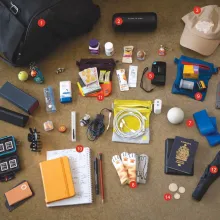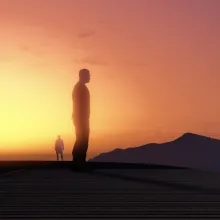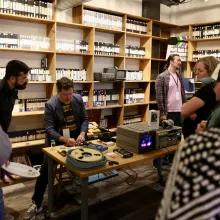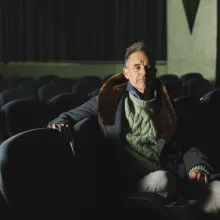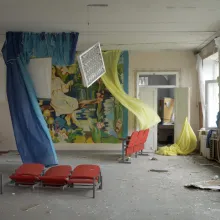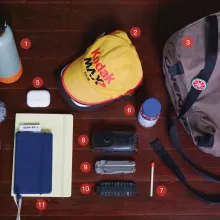documentary magazine
Cinematographer Iris Ng seeks meaningfulness in her experiences on set, on and off-camera.
Pinny Grylls and Sam Crane’s Grand Theft Hamlet (2024) is the latest in a wave of documentaries shot entirely inside Grand Theft Auto or other video games. Playing a game is often no longer a solitary exercise but a social one, and we can understand games not as experiences separate from the “real” world but as an extension of it. Within that new paradigm, it makes sense that we’re seeing more documentaries explore game spaces as if they are physical ones. Professional filmmakers and computer engineers alike recognized games’ potential as playgrounds for formal experimentation years before this trend.
Access to archival media is often the result of the invisible work of teams of archivists and technicians who preserve content on fragile media and provide it to the public. Accessing archival media can be a financial challenge for documentary filmmakers because preservation of media is as time consuming and expensive (sometimes more) as shooting new footage. Logistically, making this material available is time consuming, expensive, and requires skilled team members to coordinate. Our upcoming research study, Mapping the Magnetic Media Landscape, a project of BAVC Media, examines U.S. collection holders’ needs and how we might support them. Because of our decades of work with and for filmmakers, we can put it bluntly: All of these costs are ultimately passed on to the filmmaker.
No summary could ever do justice to what Belgian filmmaker Johan Grimonprez has created through his audiovisual-textual collage Soundtrack to a Coup d’État (2024). The year 1960, famously called the “Year of Africa,” serves as the political, social, and cultural matrix on which Grimonprez builds his manifold narrative—moving back and forth in time and space, layering sound, image, and text with texture and depth. Now an Oscar nominee, the documentarian comes well-prepared, armed with the quintessential skills of an avid researcher and a seasoned orator, opening new tabs in our minds with each question while anticipating potential criticisms with humility and curiosity. Documentary magazine sat down with Grimonprez to discuss Soundtrack to a Coup d’État in his format of choice: a dialogue.
Although few people outside China have heard of it, the West Lake International Documentary Festival—locally known as IDF, which stands for “I Documentary Fact”—has quickly become the country’s leading documentary festival since its inception in 2017. The 2024 edition of IDF was held on the last weekend of October at the Xiangshan campus of CAA on the outskirts of Hangzhou, the city whose iconic lake inspired the festival’s name. Over the past few years, IDF has made a name for showcasing formally innovative and thematically diverse works from around the world. This dispatch covers: Anĝelo in 1948, Flames, White Snow, Yellow Roses, Blanket Wearer, and The Dream of Super Bridge.
Documentary brings you capsule reviews of some highly anticipated films: Intercepted, The Last Republican, Night Is Not Eternal, and Nocturnes.
Cinematographer and director Zac Manuel captures reality without the barriers of bulky equipment.
The outcome of the Platform Films meeting was the formation of the Miners’ Campaign Tapes Project, with 13 groups (including Platform; Trade Films in Gateshead and Newcastle; Chapter Community Video Workshop in Cardiff; Amber Films in Newcastle; Birmingham Film and Video Workshop; Open Eye Film and Video Workshop in Liverpool; Active Image in Rothertham and Sheffield; Films at Work in London; and the London Media Research Group) committed to producing footage interviewing miners and their supporters and documenting strike and fundraising activities. The material was then sent for editing down, mainly by Chris Reeves of Platform and Chris Ruston of London Video Arts, into what was originally planned to be 10 shorts and one feature-length work. The final project would consist of six short tapes.

Dear Readers, I am back at IDA from a semester dedicated to research as a Documentary Film Fellow at Harvard’s Shorenstein Center on Media, Politics





